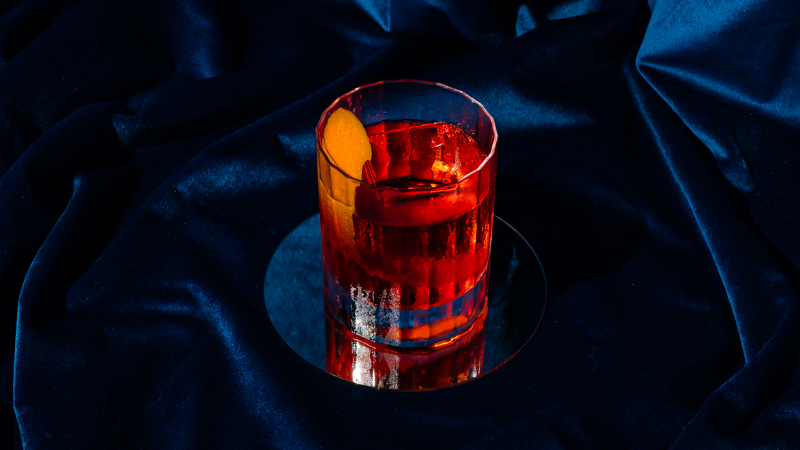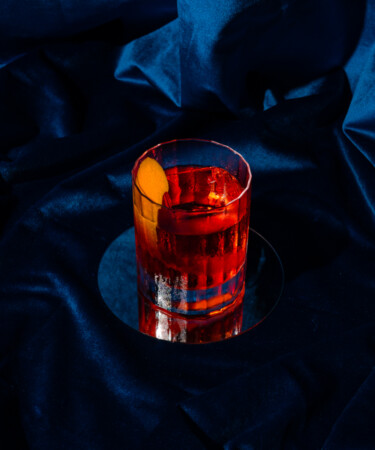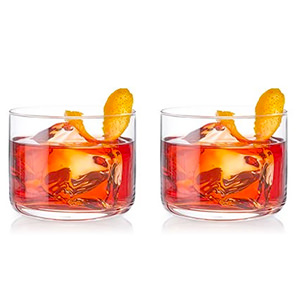The Negroni is a world-famous Italian cocktail created in Florence, Italy in 1919. The build traditionally mixes gin, sweet vermouth, and iconic Italian red bitter Campari, though the use of other bitters is a source of debate. As the story goes, the drink was invented after Count Camillo Negroni requested an Americano with more kick while imbibing at the city’s Caffe Giacosa. The resulting cocktail, which included gin, was named in honor of the Count. The Negroni is often served before a meal in order to stimulate the appetite, but is also versatile enough to be enjoyed at any time — which provides just one reason why the drink has secured the No. 1 spot on the list of the 50 most popular cocktails in the world for two consecutive years.
Need the right vermouth? See our picks for the best vermouths for Negronis!
Table Of Contents
Negroni Ingredients
- 1 oz London Dry gin
- 1 oz Sweet Vermouth
- 1 oz Campari
- Orange twist
Negroni Directions
- Add all ingredients to a chilled rocks glass with ice.
- Stir until chilled.
- Garnish with an orange twist or wedge.
Rate This Recipe:
Yield: 1
Calories: 192
Updated: 2024-04-12
Negroni Recipe Video
Negroni FAQ
What does a Negroni Taste Like?
A combination of gin, Campari, and sweet vermouth, the Negroni tastes bittersweet, with savory notes of herbs and spices. The gin used in the cocktail brings forward botanical notes that pair with the sweet cherry and citrus flavors of Campari, and sweet vermouth works to balance out any harsh bitterness from the other spirits.
Why is the drink called Negroni?
The Negroni gets its name from Count Camillo Negroni, who had developed a palate for strong liquor while working in the American Wild West as a rodeo clown. According to Italian folklore, while visiting a bar in the country, Count Negroni demanded a stronger version of the Americano cocktail — a combination of Campari, sweet vermouth, and club soda. The drink that was placed in front of him was a combination of gin, Campari, and sweet vermouth, which he later named the Negroni — after himself, of course.
Without question, the Negroni ranks among the world’s most-loved classic cocktails. Its simple recipe traditionally mixes equal parts gin, sweet vermouth, and the iconic Italian red bitter liqueur Campari, though modern variations abound. While its composition is simple, the end result is stunningly complex: Campari provides a bitter backbone which is perfectly balanced by the sweet kiss of vermouth. Last but not least, gin cuts through these ingredients, adding a further layer of nuance and the boozy kick that’s said to have inspired the drink’s creation. While the Negroni is often served before a meal in order to stimulate the appetite, it’s versatile enough to be enjoyed at any time of the day and in any season.
The History of the Negroni
Like many classic cocktails, the Negroni’s origins are somewhat anecdotal, but it’s a tale as good as any. According to the most popular version of the tale, the drink was invented after Count Camillo Negroni requested an Americano with more kick while imbibing at Florence’s Caffe Giacosa in 1919. The resulting cocktail, created by bartender Fosco Scarselli, contained gin instead of soda and was named in honor of the Count. Over time, multiple individuals have contested this story and even claimed ownership of the drink’s invention. Given the fact the earliest printed recipes for the cocktail didn’t appear until the 1950s, we will likely never be sure of who invented it. But there’s one thing that can never be contested: The Negroni has firmly withstood the test of time and is almost certainly more popular now than it’s ever been.
How to Make a Negroni
With just three simple ingredients, it’s easy to rush the Negroni’s preparation. But bartenders say this is a mistake, and that mixing up a quality Negroni requires the same attention to detail as other classics such as the Martini or Old Fashioned. Those looking to perfect the drink should start by measuring out the ingredients. This sounds simple — and it is — but using a jigger is imperative to balancing the Negroni’s complex profile. By understanding what the equal parts version tastes like, you can then tweak the ratios to suit your own preference. Finally, always stir your Negroni and if you wish to serve it on the rocks, make sure you have a large, hand cut cube on hand.
The Best Ingredients for the Negroni
While each of the three ingredients has a profound impact on the drink, none defines the Negroni quite like Campari. And most traditionalists swear it’s the only brand of red bitter liqueur that should be used in this cocktail. But there are a few worthy alternatives for those looking to switch things up. When considering which gin or vermouth to use, the answer ultimately depends on the direction you want to take the cocktail. Any experimentation should start with classic brands, such as Beefeater and Bombay Sapphire (gin), and Martini & Rossi and Carpano Antica Formula (vermouth).
Best Practices: Don’t Rush Your Negroni
Thanks to strategic corporate marketing, and the general irresistibility of Italian-style dolce vita, the Negroni is undergoing a renaissance.
According to legend, a count named Camillo Negroni invented the aperitif in Florence in 1919, combining gin, sweet vermouth, and a branded amaro, Campari. When the 21st-century craft cocktail movement arrived, parent company Gruppo Campari sensed an opportunity. It reintroduced the cocktail and its signature, cherry-red amaro to contemporary consumers, and came on board Imbibe's annual Negroni Week in 2014. Countless Negroni products and recipe variations continue to iterate.
When a drink contains just three ingredients, it’s easy to rush through the process. Don’t, say bartenders. Here are five timeless tips for making excellent Negronis.
What to do When Making Negronis
1. Measure (all) your ingredients.
Each component in this aperitif packs a lot of punch. Campari is bittersweet, gin is boozy, and vermouth is sweet and herbaceous. Measure each to keep your cocktail balanced and avoid blowing out your palate before you’ve sat down to dinner.
“This isn’t an eyeball drink,” Alex Hammond, head bartender, Tradd’s, Charleston, S.C., says. “Make sure you follow the recipe.”
It’s absolutely kosher to tweak the measurements to suit your tastes, too.
“Personally, I like my Negroni with 2 ounces gin, 1 ounce sweet vermouth, ¾ ounce Campari,” Keith Meicher, head bartender, Sepia, Chicago, says. “Play around with your ratio until you discover what tastes the best for you.”
2. Choose the right vermouth.
“A Negroni lives and dies with your choice of vermouth,” Meicher says. “Don’t just go with whatever's cheapest, or, even worse, the bottle that you forgot to refrigerate and has been hanging out in the cabinet above your stove since the Reagan administration.”
Vermouth is made from wine, so it expires more quickly than grain-based spirits. Once opened, vermouth will last approximately one month if stored in your refrigerator with its cap on.
Fortunately, good-quality vermouth is relatively affordable, and many producers offer 375-milliliter “half” bottles. Meicher opts for Cocchi Vermouth di Torino, which starts at $18.
3. Keep it cool.
Bartenders typically serve Negronis in a rocks glass over ice — preferably one large rock — or up, in a chilled cocktail glass. Whichever you choose, make sure your drink is served cold. This is an aperitif, after all, designed to be bright, refreshing, and appetite-inducing.
If you’re out of ice and feel like fixing a room-temperature cocktail, no one’s going to stop you. But we recommend serving it cold. Negronis have a lot of big, bitter flavors, and chilling mellows and marries them.

What to Avoid When Making Negronis
1. Stir, don’t shake.
“Don’t rush in mixing the ingredients,” Hammond says. “A good Negroni should be stirred lightly so that the flavors meld.”
Pour all your ingredients in a mixing glass with clean ice, Hammond says, and then stir, slowly and evenly. Pour the finished drink into your chilled cocktail or rocks glass. This way, you combine flavors without watering down your cocktail.
2. Ditch the weird garnishes.
The classic Negroni garnish is an orange zest twist. Its gently bittersweet flavor is a good foil for the drink.
“To garnish with a lemon wedge is a heinous crime,” according to Difford’s, “but I am quite partial to a fat orange wedge.”
While we wouldn’t call lemons criminal, they are too sour to complement Negronis’ bittersweet balance. Limes, grapefruits, or cocktail cherries similarly have no place in your Negroni.
If you don’t have an orange lying around, simply serve your aperitif unadorned. Nothing whets the appetite like confidence.
Negroni Variations To Try:
Popular Negroni Riffs:
- White Negroni - Perfect for hot days, the floral, bittersweet White Negroni is a simple, three-ingredient cocktail that is sure to please.
- Mezcal Negroni - Using the composition of a certain trendy Italian cocktail, the Mezcal Negroni proves how adaptable earthy agave truly can be.
- Tequila Negroni - A twist on the classic cocktail with Blanco Tequila instead of gin, and a touch of 18.21 Blood Orange + Ginger Shrub to give it some extra flair.
- Calvados Negroni - This festive riff swaps gin for Calvados — a versatile French, food-friendly brandy made from apples and pears. While apple aromatics are reminiscent of fall, this cocktail is in season all year long.
- Aperol Negroni - The Negroni has long been synonymous with Campari, but this variation may sway you toward its sweeter cousin: Aperol.
- Negroni Sbagliato - This bubbly rendition gives a bitter, herbal classic a sweet and fizzy twist that will make you want to be mistaken more often.
Other Negroni Riffs:
- The Rum Negroni - Our rum Negroni is your training wheels into the intense, explosive-but-complicated world of this Italian cocktail.
- The Vine-Groni - Big fan of a Dirty Martini? Drink this next. Cucumber-infused gin, rice vinegar, and salt solution contribute to the drink’s briny, savory profile. Green olive and Persian cucumber provide a tasty garnish.
- The Rosemary-Smoked Negroni - With the additional aromatics of smoke and rosemary, this Negroni provides the perfect excuse to set your garnish alight. (Just don’t get carried away playing with flames!)
- The Pineapple Negroni - In this recipe, the Negroni takes a tropical turn. A splash of pineapple juice adds a touch of sweetness, perfect for those who shy away from a more bitter flavor profile.
- The White Chocolate Negroni - If you like a Negroni or an Old Pal, this whiskey-based cocktail is one to try. The vermouth's herbal notes are balanced by a touch of chocolatey sweetness.
Looking for more? Here are the best Negroni variations according to 15 bartenders!

